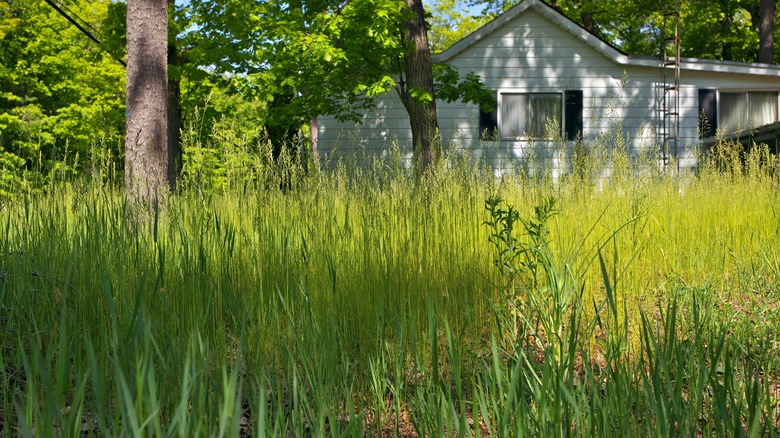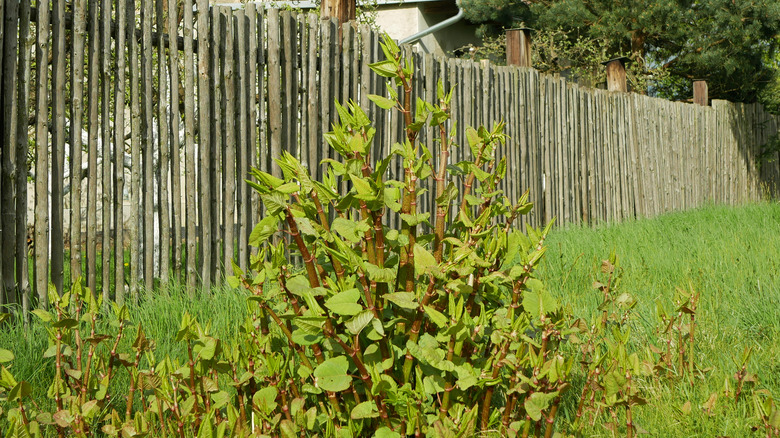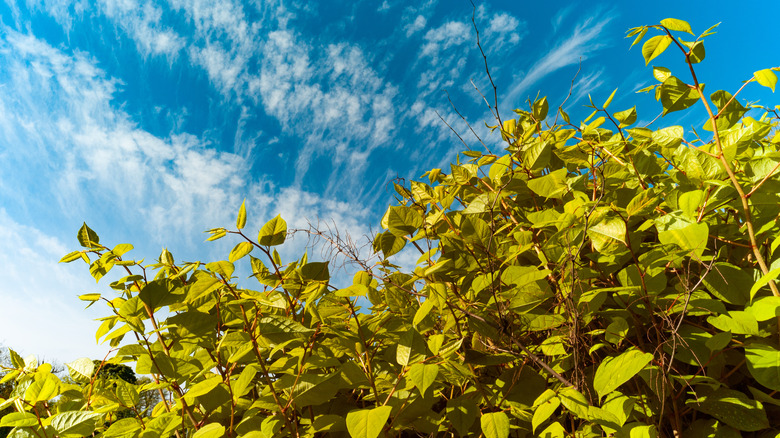The Notorious Weed That Could Tank Your Home's Value Before You Sell
A tree in the front yard or garden in the back isn't just pretty landscaping, but can be the basis for a profitable outdoor space. Planting grass, hedges, and flowers is one thing you can do to boost your home's value. However, not every plant has this lucrative superpower. In fact, Japanese knotweed (Reynoutria japonica) can do the exact opposite. In an exclusive House Digest interview, Ryan Fitzgerald, realtor and owner of Raleigh Realty, said, "Unquestionably, the resale value of a house can be adversely affected by the presence of Japanese knotweed." It's notoriously difficult to get rid of, can lead to grave damage, and dissuades banks from giving out home loans.
If you're selling a property, you want to make sure it is free from Japanese knotweed; otherwise, you might have to settle for less. And don't think you can just turn a blind eye to the issue. According to Fitzgerald, "Sellers are legally required to disclose the presence of Japanese knotweed on their property in many jurisdictions. Failing to do so can result in legal consequences and financial liabilities if the buyer discovers the knotweed after purchase." Yikes. This invasive weed is a nightmare for you and the environment. Fortunately, there are ways to remove the unwanted plant and reverse the financial curse it causes.
Japanese knotweed can lower your home's value
Japanese knotweed is one of the worst invasive plants you can have on your property. "This invader is famous for its swift growth and ability to harm property structures such as foundations, walls, and drainage systems," Ryan Fitzgerald exclusively told House Digest. If it takes over, it's only a matter of time before cracked driveways, clogged pipes, and overhauled gardens become a reality. However, controlling this unwanted plant is easier said than done. It only needs a ½ inch of plant to regrow. With a stem that shoots 3 inches a day during growing season, a spread of up to 70 feet, and roots that reach 20 feet deep, it takes a lot to stop this species.
This plant is so notorious that even if potential buyers aren't privy to the prospective damage, chances are, lenders will be. "Quite a number of mortgage lenders are hesitant about giving loans on properties that have Japanese knotweed since it can lead to costly and widespread repairs," he explained. The destructive nature and expensive cost to remove the weed hacks at your home's bottom line. However, Japanese knotweed isn't the only invasive plant species to look out for. Fitzgerald noted giant hogweed (Heracleum mantegazzianum), Himalayan balsam (Impatiens glandulifera), and bindweed (Convolvulus arvensis) can also hurt your property's value. Even if your home isn't on the market, you'll want to get rid of Japanese knotweed and any other unwanted plants.
What to do if you have Japanese knotweed on your property
Weeding out Japanese knotweed and other invasive species is the obvious thing to do. However, if you tried the most effective methods to kill Japanese knotweed and the plant still lingers, then it's best to reach out to the professionals. As Ryan Fitzgerald told House Digest in an exclusive interview, "A professional knotweed removal company can create a management plan." This can comfort buyers and lenders as they'll know the issue is being taken care of by experts. Plus, it looks good to lenders and potential buyers. "Securing insurance-backed guarantees for knotweed treatment is crucial," Fitzgerald added. This specific kind of insurance will still cover you if the plants ever return.
While Japanese knotweed hurts your home's value, it doesn't have to make the property worthless. You can add value in other areas to counteract the depreciation. "Some ways of enhancing other parts of the property include modernizing interiors, working on landscaping (using non-invasive plants) as well as making sure that all repairs are up-to-date to present a more appealing overall package," the real estate expert shared. As long as you're taking care of the weedy situation and the rest of the home is in tip-top shape, you might be able to reverse the percentage this invasive plant clinches from the property's value.


